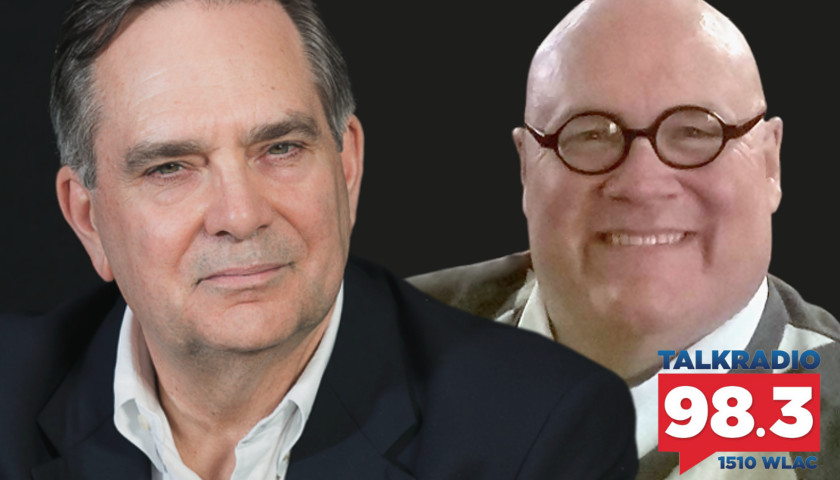Live from music row Monday morning on The Tennessee Star Report with Michael Patrick Leahy – broadcast on Nashville’s Talk Radio 98.3 and 1510 WLAC weekdays from 5:00 am to 8:00 am – Leahy was joined on the newsmakers line by former public education teacher and author of Can America’s Schools Be Saved, Edwin Benson to discuss Seattle’s current public school curriculum which somehow manages to correlate ethnic studies with mathematics.
During the second hour, Benson (pictured above, right) explained how the Seattle public school curriculum has correlated ethnic studies with mathematics claiming that the legitimacy and expression of the western world’s mathematical identity and intelligence’s definition is itself used to disenfranchise people and communities of color.
Benson read a portion of the curriculum:
‘Power and oppression as defined by ethnic studies are the ways that individuals and groups define mathematical knowledge so as to see western mathematics as the only legitimate expression of mathematical identity and intelligence. This definition of legitimacy is then used to disenfranchise people and communities of color.’
Leahy: And so the public schools, I think they cannot be salvaged in the current form because they’re just too many institutional problems. We’ve had 30 years of bad history and bad civics being taught and very little civics. But that which is being taught is bad. You wanted to talk about that a little bit today.
Benson: Yes. Well, I stumbled across, last week a curriculum from the Seattle public schools.
Leahy: Oh my goodness. Uh-oh.
Benson: I thought this is going to be interesting.
Leahy: It’s trouble already in Seattle public schools. I can’t wait to hear what they’re teaching K-12 kids in public schools in Seattle.
Benson: The title of this document is, ‘K-12 Math and Ethnic Studies Framework.’
Leahy: (Chuckles) Math and Ethnic Studies. They obviously go together.
Benson: Clearly. At least when the California people tried pulling off this Ethnic studies thing they tried pulling this off a couple of weeks ago they tied it to social studies. (Laughs) But this is Math. And the four major themes that most people thought that the four major themes in mathematics where addition, subtraction, multiplication, and division.
Leahy: That’s what I thought. Those are the four fundamental operations of mathematics. You build everything from those four operations.
Benson: Absolutely. The themes on this one are origins, identity, and agency. (Leahy laughs) Power and oppression. The history of resistance and liberation. And reflection and action.
Leahy: This is for mathematics?
Benson: Yep.
Leahy: For first graders and second graders?
Benson: K-12.
Leahy: K-12!
Benson: Yeah, we’re going to go all the way across the board.
Leahy: Really, this is not like The Onion or the Babylon Bee? This is actually true stuff.
Benson: This is the real thing. (Leahy sighs) For each of these themes, there’s a definition. And I think the one for power and oppression just kind of gives you the whole thing in a nutshell.
Leahy: So what is the definition? In mathematics, part of the curriculum in K-12 in Seattle public schools. What is the definition of what do they call it, power and privilege?
Benson: Power and oppression.
Leahy: Power and oppression. Got to get that terminology. Tell us, what is it, Edwin?
Benson: OK. It’s a little long because this is education ease but we’ll get it. ‘Power and oppression as defined by ethnic studies are the ways that individuals and groups define mathematical knowledge so as to see western mathematics as the only legitimate expression of mathematical identity and intelligence. This definition of legitimacy is then used to disenfranchise people and communities of color.’
Leahy: Obviously Edwin.
Benson: Clearly.
Leahy: How did we miss that. (Laughs)
Benson: You know I got all the way through school and never heard that. I found math oppressive.
(Commercial break)
Leahy: What other craziness is going on in education and in particular going on in Seattle and in civics today?
Benson: Yeah, well you know, and they’re trying to find this mix up between ethnic studies and mathematics and I just want to throw out one more of the questions from this document here.
Leahy: By the way, does 2+2+4 for everybody? Or does it like mean something different for people depending upon their ethnic background.
Benson: Well if it means something different to you then you’re being oppressed.
Leahy: Oh, OK. There you go. So if you get it wrong you’re being oppressed. OK, what else do you have from Seattle there for us?
Benson: Who holds power in the mathematics classroom.
Leahy: No, no, no. This is really in the Seattle curriculum.
Benson: It really is there.
Leahy: We have a bunch of Kindergarteners learning mathematics learning how to add in Seattle. But the first thing they need to know is who holds power in the classroom. (Chuckles)
Benson: Absolutely. If you haven’t figured that out yet then you’re not ready for kindergarten. How can math help us understand the impact of economic conditions and systems that contribute to poverty and slave labor?
Leahy: Slave labor.
Benson: Slave labor.
Leahy: Yeowww. So who writes this kind of stuff? You’ve been in public schools for 30 years or so. How does such a curriculum get into the classroom? How does that happen?
Benson: Basically you take a half a dozen teachers and you hire a couple of experts and they come in and they work with the teachers for a week and you develop this sort of curriculum document. And everybody gets a week of summer work. And get’s paid for it which is always a helpful thing. And then when you’re done you just sit back and marvel at your own brilliance,
Leahy: This is going on all around the country then?
Benson: Oh sure. This is a very common process.
Listen to the second hour:
– – –
Tune in weekdays from 5:00 – 8:00 am to the Tennessee Star Report with Michael Patrick Leahy on Talk Radio 98.3 FM WLAC 1510. Listen online at iHeart Radio.





